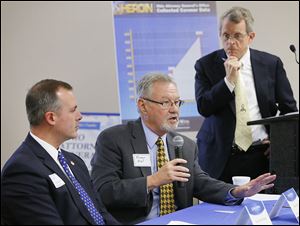
DeWine says heroin addiction is ‘epidemic’
State AG, others probe strategies
11/19/2013
Dr. Orman Hall, director of Gov. John Kasich's Healthy Ohio office, speaks as Ohio Attorney General Mike DeWine, right, and state Rep. Robert Sprague listen during a forum at the Emergency Services Training Center on Jefferson in downtown Toledo.
Parents, recovered addicts, service providers, and law enforcement officials agreed during a 90-minute community meeting Tuesday that Ohio — including Lucas County — has a heroin epidemic.
Attorney General Mike DeWine convened a roundtable discussion in downtown Toledo, the second in a series of meetings he plans to hold around the state, to bring the issue to light and to talk about solutions.
PHOTO GALLERY: Forum on drug abuse
One parent of a 26-year-old heroin addict said her son has “a good heart, a good soul” but is headed to prison because of his inability to resist the highly addictive drug.
“He didn’t want to be a criminal. It grabs you," said Sheri Lesinski, 52, of Toledo, who has three other sons. “The epidemic is so terrible in Toledo. The success rate is so very low; they’ve closed all the units in the hospitals.”
“Please don’t write them off. Find another way than putting them in prison or burying them,” Ms. Lesinski pleaded to the group.
She was preaching to the converted.
Mr. DeWine pointed to statistics showing a rapidly increasing rate of heroin-related deaths.
“We have a heroin epidemic in the state of Ohio. We’re losing at least two people a day, probably many more,” Mr. DeWine said. “It’s not abating and it’s not plateauing out.”
He has announced he is dedicating about $1 million to a new heroin unit to help law enforcement fight back.
New data Dr. James Patrick, the Lucas County coroner, released Tuesday show heroin-related deaths doubling annually in the county since 2010, from eight that year to 15 in 2011, and 31 in 2012. As of August, 52 heroin-related deaths occurred in 2013, said chief toxicologist, Dr. Robert Forney, who added that he has tentative findings for 34 more through October.
“I think we’re going to see over 100 for the year,” Dr. Forney said in an interview Tuesday. Most of the victims of heroin overdose were middle-aged, suffered from chronic pain, and had graduated from prescription painkillers, he said.
An increase in hospitals and doctors treating pain followed by a crackdown making it harder for people to fill their prescriptions at multiple pharmacies contributed to the problem, Dr. Forney said. Most cases were in combination with other drugs, such as prescription opiates and anti-depressants, he said.
“What happened is we have a lot of opiate use that we didn’t have in the past,” he said.
Dr. Orman Hall, a panelist and the director of Gov. John Kasich’s Healthy Ohio office, said the root cause is prescription opiates. A prescription painkiller such as Vicodin costs about $1 per milligram, and an average addiction is 100 milligrams per day. Some need 500 milligrams or more, he said. Heroin, Dr. Hall said, costs a tenth as much.
“A number of people are progressing through their addiction. They’re not able to meet the demands of their addiction because they don't have the resources and are moving from prescription opiates to heroin,” he said. “Nobody starts out on opiates thinking, ‘I want to be a heroin addict,’ but many people end up there."
Dr. Hall and others said heroin is contributing indirectly to other deaths and damage, through suicide, car accidents, and crime.
Drug courts are “very effective,” as is “medication-assisted treatment,” such as methadone, he said.
Many panelists fretted that no money is available to treat addicts, but Dr. Hall said the state is piloting a medication-assisted treatment program with drug courts in five communities.
“We need to have the political will to deal with the significant over-prescribing that exists in our health-care system,” he said.
Lucas County Juvenile Court has received federal funding for its Reclaiming Futures treatment initiative, said Deborah Hodges, juvenile court administrator. She said five treatment agencies have agreed to follow the model required by the federal funds.
“The treatment takes a lot longer with a substance like heroin, and you have to be there for the long haul,” she said.
One speaker, a parent and local treatment-center counselor who identified herself as Tammy, said 99 percent of the addicts coming to her center do not have insurance. She estimated the price of one addiction treatment center at $100 per day.
“But it’s not a 30-day program. They have to be held by the hand for a year,” Tammy said.
Also on the panel were:
● Dean Sparks, executive director of Lucas County Children Services.
● Lucas County Sheriff John Tharp.
● Lucas County Prosecutor Julia Bates.
● Jeannie Claire, advocate for Young People in Recovery, based in Cleveland.
● Matthew Rizzo, vice president of A Renewed Mind of Toledo.
● State Rep. Robert Sprague (R., Findlay).
Contact Tom Troy: tomtroy@theblade.com or 419--724-6058 or an Twitter @TomFTroy.